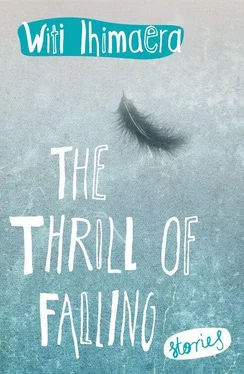All my life I’ve been searching for this perfection.
The air rushing into my lungs … and oh …
Then comes the sense of weightlessness and, yes, it is possible to defy gravity.
Up here, I’m in perfect suspension between heaven and earth, slowly twisting and turning and tumbling and unwrapping myself.
Glitter explodes like silver rain across the audience.
Ancient drums and conch shells raise fanfare after fanfare as I slowly descend the rainbow bridge to the Endeavour below. The audience applauds my beauty.
Hovering above the prow, I unroll at the horizontal, spinning, spinning, spinning down.
At the last minute I release the rope.
The audience screams.
Oh, the thrill of falling.
The screams turn to applause again as I alight on the prow of the Endeavour .
I bow to the three Maori waka.
I make a further bow to the audience and, in particular, to the place where my Koro must be sitting. I’m wearing a circular cap, like a woven helmet, and from it sprouts the tall headdress of beautiful red, yellow and black feathers. My body glistens with oil and around my midriff and thighs I wear a girdle of red feathers. A shoulder cape reaches down to the waist and is tipped with a fringe, this time of yellow feathers.
And then I begin to dance.
I was named after the man who was the captain of the ship called the Endeavour . He brought the God ’Oro to Aotearoa.
Can you see, Koro? Can you see?
My name is Tupaea.

Maggie Dawn
A few years ago I saw a young Maori girl in a Porirua mall minding her small brother and two sisters. She was buying them an ice cream: one ice cream to share. I bought a second one for them and gave them some money so they could see a movie. She said that she would pay me back, and that one day she was going to own her own mall. I’m looking forward to meeting her again on that day.
We’ll Always Have Paris
Film buffs of 1940s films will immediately recognise the title of this story, which comes from the classic 1942 Warner Brothers film, Casablanca , produced by Hal B. Wallis, with a screenplay by Julius J. Epstein, Philip G. Epstein and Howard Koch, and directed by Michael Curtiz. The film starred Humphrey Bogart, Ingrid Bergman, Paul Henreid and Claude Rains.
‘When I Fall in Love’ is one of many songs composed by Victor Young. Lyrics reproduced here courtesy Alfred Music Publishing.
One More Night
In 2007 the prize-winning and very successful playwright Albert Belz (Ngati Porou, Nga Puhi, Ngati Pokai) approached me for permission to use my first collection, Pounamu, Pounamu (1972), as the basis for a playscript. At the time Pounamu, Pounamu was the subject of another adaptation proposal, so I suggested to Albert that he should use my second collection, The New Net Goes Fishing (1976). He set to work on a play, Whero’s New Net , which expanded one of the main themes of the collection — the urban migration of Maori from the East Coast to Wellington — to a depiction of the New Zealand diaspora and the migration of Maori to London.
The play was premièred by Massive Theatre Company in Auckland in 2009. It was provocative and intriguing and it gave me an idea: Albert had turned my stories into a play and I thought it would be interesting to turn the play back into fiction; among his other plays are Awhi Tapu (2003), Yours Truly (2006), Te Karakia (2007) and the highly acclaimed Raising the Titanics (2010). My thanks are due to Albert, and James Kyle Wilson and Sam Scott of the Massive Theatre Company Ltd, for allowing me to use the script of Whero’s New Net as the basis for the novella.
The lyrics are from the song ‘Kingfisher Come Home’, which I wrote for Charlotte Yates, and the words were first referenced in my short story ‘Halycon’, Te Ao Hou magazine, 1971. The song was one of twelve original lyrics put to music by well-known New Zealand singer-composers and premiered in Ihimaera at the 2011 Auckland Arts Festival.
Lyrics quoted from ‘ Home and Away Theme’, words and music by Mike Perjanik, are quoted courtesy of Mike Perjanik Productions Pty Ltd.
Red is the English translation of the Maori name, Whero.
Purity of Ice
The story itself goes all the way back to my 1950s childhood when, as a boy living on a farm, I would write stories on my bedroom wall at night. Most were about being the captain of a spaceship or submarine, and one of them was accompanied by a small pictograph: the lassoing of an iceberg and towing it to a base in the fiords of New Zealand. Fast-forward to 2011 and the bones of the story are still there, a genre piece of science fiction-fantasy, mixed up with the effects of global warming.
Herman Melville’s Moby Dick (1851) is one of the world’s greatest novels. As well as giving the white whale’s name to the giant phantom iceberg, I have used chapter headings from the novel and extracts from it are featured in the story.
Readers will note the reference to Apsley Cherry-Garrard’s The Worst Journey in the World , Chatto & Windus Ltd, London, 1922. There’s a passage in the book that has always haunted me:
‘Our problems are not new: they are as old as the men who hunted the prehistoric hills. When they hit one another on the head with stones the matter was confined to a few caves: now it shakes a crowded world more complicated than any watch. Human nature does not change: it becomes more dangerous. Those who guide the world now may think they are doing quite well: so perhaps did the dodo.’
And Cherry-Garrard wrote this ninety years ago.
For those interested, a US patent (6616376 — Bagging Icebergs) was issued to Richard Fuerle, on 9 September 2003, covering a method and apparatus for bagging an iceberg. One edge of a large, flexible, waterproof bag, with floats at the open end and a drain at the bottom, is sunk and drawn under an iceberg by a ship. When that edge is refloated, the iceberg is inside the bag. The edges of the bag are tied over the iceberg and salt water is pumped out of the bag from the drain. As the iceberg melts, the bag fills with fresh water and can be pulled by the ship to where the fresh water is needed. The water can then be pumped out of the bag through the drain.
Orbis Terrarium
The only story in this collection to have been published before, ‘Orbis Terrarium’ is the result of a commission from Italian editor Marco Sonzogni for a story for Second Violins (2008). New Zealand authors were given introductory paragraphs from unfinished stories by the great Katherine Mansfield and invited to use the paragraphs for the creation of their own stories. In my case, I had just returned from a trip to the Galapagos Islands, where I had fulfilled one of my great ambitions: to look into the eyes of the oldest living creatures in the world, the giant tortoises of the Galapagos.
The first paragraph is from Mansfield’s unfinished ‘Such a Sweet Old Lady’, 1923.
I have set the story in April 1982, the centennial month and year of Charles Darwin’s death.
The Thrill of Falling
I decided to write this novella to commemorate the latest Transit of Venus, in June 2012, and the special conference and celebrations held in Uawa. The spelling of Tupaea is the Maori one. In Tahiti he is called Tupaia. Other sources call him Tupia.
‘A hee mai te tua …’: this version of the origin of ’Oro was dictated in 1840 by Tamara of Tahiti and Pati’i of Mo’orea, as cited in Donald S. Oliver, Ancient Tahitian Society, Vol 2: Social Relations , Australian National University Press, Canberra, 1974. It is the source of most of the information about ’Oro and the Arioi.
Читать дальше













